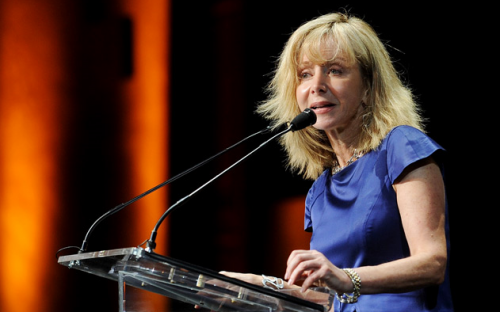When Maria Kolesnikova chose to begin an MBA at the world’s top business school, she was managing a $3 billion budget for Rosneft, Russia’s biggest oil supermajor. But, like many of her peers at INSEAD, the former investment manager is seeking out new MBA job opportunities.“For women especially, it’s not that easy to pull off a career change. But when you take an MBA, this pushes you beyond your limits, and helps to make a transition,” says the full-time student in Fontainebleau, France.
Maria is in a minority — 30% of INSEAD’s cohort of MBAs are women. But she is one of a number of talented female managers that business schools are increasingly seeking to entice. “Enrolling more women is a huge priority. It helps the learning community, brings diverse perspectives, and taps into the economic power of women,” says Judy Olian, dean of UCLA Anderson School of Management, one of a handful of female school leaders.
But she admits that when it comes to women in business, there’s been precious little progress, despite recent efforts. “Twenty-one of the Fortune 500 CEOs are women. It’s down a little bit on last year. There’s a huge way to go,” says Judy, with feeling.
Twelve elite US schools now teeter at around 40% female MBA enrolment, according to Forté Foundation, a consortium trying to advance women’s business careers. But the figure hasn’t risen above 37% globally over the past decade, according to AACSB, which accredits business schools.
For many the answer has been scholarship cash. According to Forté, 36 MBA programs partnered with the organization funded $18.5 million in scholarships to women last year, up from $5.6 million in 2010.
Sunil Kumar, dean of University of Chicago’s Booth School of Business, says: “Scholarships are good — they provide a substantial short-term benefit to the student.”
Rebekah Lewin, assistant dean of admissions and financial aid at the Simon Graduate School of Business, estimates that more than 80% of its full-time MBA women have scholarship support, ranging from $10,000 to full tuition, currently $46,000/year.
“It’s been one important factor among several that is helpful in recruiting women,” she says.
Generous donations have fuelled the scholarship boom. Coutts, the private bank, reckons $7.6 billion was gifted in donations to higher education in 2015. High-profile backers, such as Nike founder Philip Knight, Microsoft’s Gill Gates, and Blackstone chief Stephen Schwarzman have committed nine-figure sums.
“Female students are eligible for a number of endowed scholarships that have been generously gifted by Fuqua and Duke alumni,” says Allison Jamison, director of the Daytime MBA at Duke’s Fuqua School of Business.
Allison says that enrolling more women in MBA programs, where they can build not only their skill-sets but their professional networks, is key to closing the gender gap in executive ranks.
“My speculation is that as women pursue these degrees and migrate into executive ranks, then the gaps we see at the C-level will be closed in a shorter period of time,” says Idalene Kesner, dean of the Kelley School of Business at Indiana University. “[But] we’re still struggling in some ways. The progress has been slower than even I expected.”
According to accounting firm Grant Thornton, female senior management has moved up only 3% in the past decade, to 22%.
Yet business schools continue to do wonders for women who aspire to climb to the C-suite — 50% of female Fortune 500 CEOs have MBAs. “I would recommend it to people from all walks of life,” says Tara Louise Reddy, an MBA candidate at London Business School, who has since landed a plethora of roles at tech companies in the UK capital. “It gave me a great start,” she says.
Student Reviews
Duke University Fuqua School of Business
Supportive atmosphere
The professors at Duke university exhibit exceptional commitment to the success and well-being of their students by ensuring their academic growth and fostering a supportive social atmosphere. Moreover, the entire community is recognized for its amicability and inclusiveness.
Diversity
The people or the students are without a doubt Duke's greatest asset. While all students are driven to succeed, they are also enthusiastic about a variety of hobbies. You run across a huge lot of diversity. It is the ideal example of a school with well-rounded students and the ideal balance of campus life in a metropolis.
Happy to school
All I could ever hope for is Duke University. That really epitomizes the "work hard, play hard" philosophy that elite colleges frequently pursue. Even though you'll have a lot of schooling to complete over the week, it's simple to keep focused because all of your friends are putting in similar amounts of effort. Many events taking place on and around campus on the weekends provide a great way to unwind. The combination of demanding academics and traditional college fun strikes the perfect balance.
Good schooling
Living, eating, learning, and developing who you want to be as an adult are all fantastic at Duke. I participated in student athletics, and I couldn't have asked for a better interaction with the faculty and other students. I appreciate all of the help I get from the Duke community more than anything. Furthermore, the teachers take the time to get to know you, and the lectures are diverse and demanding (if you do the same). I'd give it a 10 out of 10.
Beautiful School, Nice Classes
DU remains one the greatest and best universities that I have ever stepped in. The school is beautiful and neat. The classes are spacious and also very nice. I enjoyed attending my Lectures in those lecture halls. I also loved the Lecturers because of the good work they did. The university also has very good dorms that are given to students on first come first serve basis and they are affordable
Amazing experience
I received my B.S. in Biology and B.A. in Global Health with a minor in Chemistry from Duke University. I was able to grow as a student, scientist, and global health advocate with the help of my friends, professors, and other mentors I met along the way. A lot to learn if you look and ask, a great place to learn for those who want to learn.
whirlwind of growth and change
An amazing 2 years, with covid and everything else happening Duke has been a place of growth for me. The courses , classes were one of a kind, online and on campus. But the valuable lessons learned in the classes are irreplicable. The students are amazing here, so much diversity , I had no problem fitting in. The teachers are down right brilliant and so helpful. Don't be afraid to ask them anything. Graduated with my MBA with Duke and now my future awaits.
One of the best for Business students
Graduated with an MBA. The classes were very insightful and engaging. The staff are very easy to deal with. The teachers and students, are truly amazing people. Grateful to all the people I've met along the way at Duke. I've learnt a great deal that will help me in my future endeavors. The campus itself is a marvel, it is beautiful.
The university campus is awesome
I graduated with a masters degree in Religious Studies from Duke University. One thing I really liked about the university is its huge campus. It is spread in a large area with a lot of greenery and also have the facilities of reading rooms for single person also. My department building was very well taken care of. The library is immensely populated with books for all your needs. The faculty is very nice to students. The classes are equipped with latest technology to cater the needs of students. The University also provides room rentals for international students. They are very well maintained and priority is given to the International students for a comfortable stay there. There are weekly events conducted by the University as well as Student clubs for the entertainment of students. Anybody can take part in them and show their talents. I enjoyed my degree and I graduated in 2021 and was very happy that I had graduated from a reputed University.
Program Flexibility and Vibrant Campus Life
Duke University is renowned for its rigorous academic programs and vibrant campus life. The university offers a diverse range of majors and research opportunities, supported by world-class faculty.
What I particularly liked about Duke was its strong sense of community and the wealth of extracurricular activities available to students. The campus is beautiful, with top-notch facilities and a supportive atmosphere that fosters both personal and academic growth.
Overall, I would highly recommend Duke University for its excellent educational offerings and strong alumni network. If you're looking for a place that challenges you academically while offering numerous opportunities for personal development, Duke is an excellent choice.








